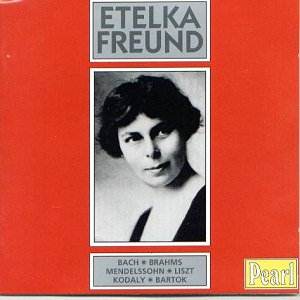Not many musicians who had played to Brahms lived into
the late 1970s but Etelka Freund (1879-1977) was one. She was
taught initially by her brother, Robert, himself a fine musician
who had studied with Moscheles, no less, as well as Tausig and
Liszt and was twenty-five years Etelka's senior. She was also
taught by Ignaz Brüll despite having also been accepted by
master pedagogue Leschetizky. It was during her Viennese years
that she called on Brahms, weekly, to play to him. In 1898 she
went on to Busoni and she was, and was to remain, a favoured and
much admired student of his. He wrote well and admiringly of her.
She knew Bartók for many years and was apparently responsible
for introducing him to Busoni. She was an early exponent of Bartók's
music, his Op. 6 Bagatelles and the Sketch in particular. Her
marriage in 1910 led to her effectively giving up public performance
for the next quarter of a century, only resurfacing in 1936, at
which point her career took on depressingly familiar - and yet
not entirely unprofitable - turns. She emigrated to America in
1946, joining her son (who was majorly responsible for ensuring
that so many of her radio broadcasts were recorded). Her US debut
was in the following year (at Washington's National Gallery) In
her early seventies she made a couple of now exceptionally rare
LPs for Remington (and off-shoot Plymouth, Chopin Waltzes) by
which any external reputation she had was for long to be judged.
Some of these are here, added to which we have a welter of astoundingly
rare broadcast survivals. I suppose analogies could be made between
these recordings and those initiated by Michael G. Thomas of the
Pupils of Clara Schumann - Adelina de Lara and Ilona Eibenschütz
amongst them. Valuable performance traditions can always be inferred
and debated when it comes to those musicians who have an unusually
close association with a composer. The temptation in Freund's
case, for example, as in say Fanny Davies' Schumann is to seek
something concretely explicatory about a performance tradition.
Whether, in Freund's case, it is any more or less significant
than say Steinbach's or Fiedler's Brahms (we have the latter on
disc) is of course a complex issue.
The Brahms Sonata, amongst the most valuable of the set, derives
from a Remington LP of 1953. Now seventy-four and with a sporadic
career behind her this is a revealing performance. Implacable
but not granitic in the Allegro maestoso, she is neither improbably
fast nor luxuriantly slow. She's not note perfect and sometimes
her rhythm seems off-hand. However judged against the live Gieseking
recording issued on Arbiter these tracks reveal her to be a musician
of probity in comparison to his lacerating and damagingly plundered
performance, with dropped notes plastered over the score. Though
she opens the slow movement sounding quite jaunty, comparison
between tempo extremes here (Oppitz 12.48 and Grainger 8.41) reveal
her to have taken an entirely natural tempo. The narrative breadth
is well and truly conveyed. The trio section of the Scherzo is
most attractively done. The Intermezzo is otherworldly, funereal,
almost Mahlerian in her hands. The finale has a songful naturalness
and a steady, cumulatively expressive nuance. Throughout she plays
with generous lightness; her touch is fine, her conception eschews
the sense of doggedness. The Variations and Fugue on a theme of
Handel is equally impressive, if more than once a technical problem
for her; joyful with splendidly detonated runs in the very first
variation, powerful and grandiloquent in the fourth, frolicsome
and subtle in the fourteenth. She demonstrates marvellous accenting
and genuine clarity of voices in the twenty-third variation.
Her Bach is laced with romanticised depth, the Mendelssohn is
notably athletic still, her Liszt reflective. Funérailles
is quite soft-grained in comparison with a hyper virtuoso performance
such as Horowitz's. The Bartók includes those two works
so closely associated with her name, the Bagatelle and the Sketch
(Op. 9b No. 4) - both marvellous - and a selection from For Children,
those little glistening gems that she plays with such obvious
current of feeling. She also plays more Brahms. Rightly or wrongly
one still pursues her for even tangential clues as to how they
should "go." Interestingly whilst the A minor Intermezzo
(from a Remington LP) is attractively small-scaled, the rather
earlier 1950 Capriccio in F sharp minor - recorded off-air - lacks
a certain sympathy. It may be a feature of the recording level
but she doesn't seem to have used enough left hand. Otherwise,
most instructive.
Freund lived on for another twenty years after the last of these
private performances. Her tiny commercial discography has been
fascinatingly enriched here - transfers by Seth Winner who has
done excellently with the occasional distortion and general wear
and tear, on the acetates and tapes especially. Notes by Allan
Evans are extensive and most informative.
Jonathan Woolf

